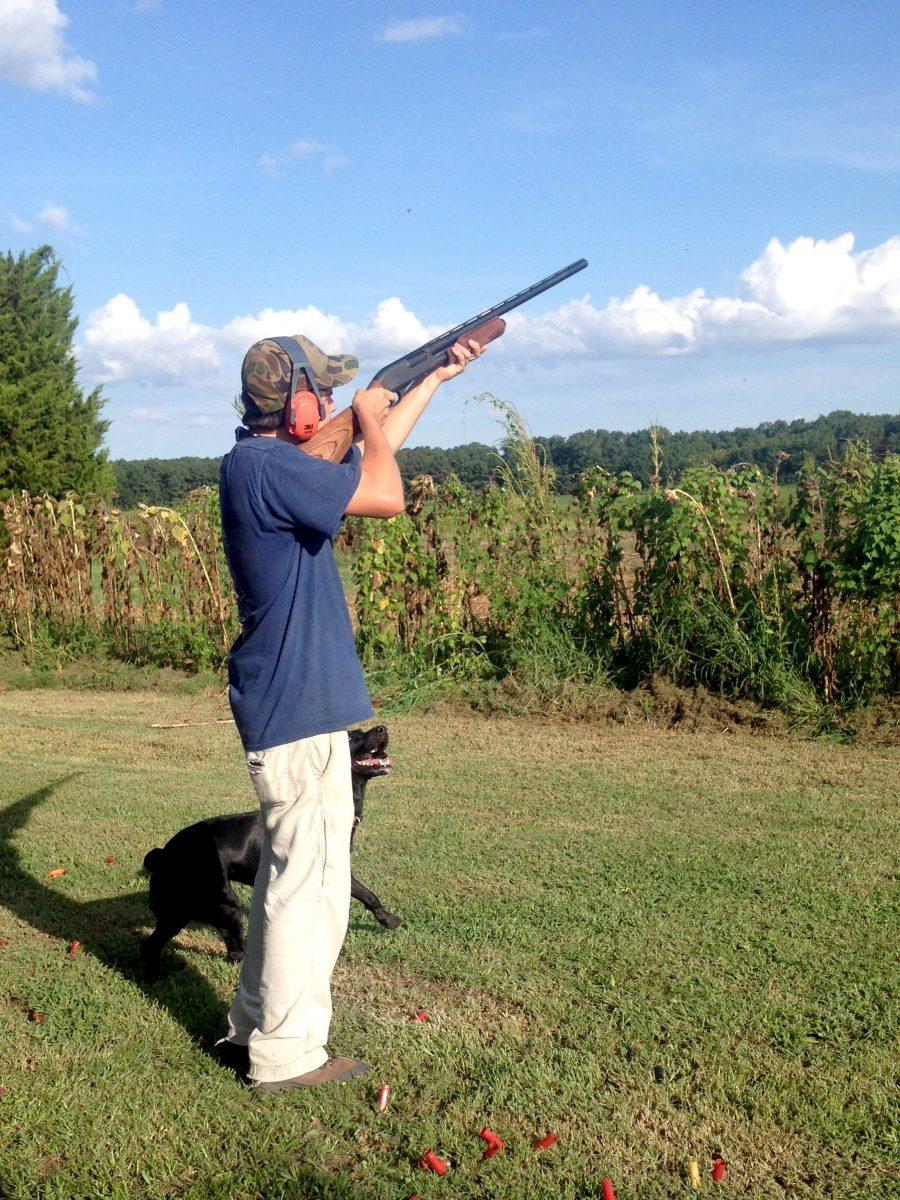Sitting in the woods, surrounded by friends, Tate Mayo waits, rifle in hand, his eyes towards the trees and the sky.
Dove season is in full swing for North Carolina. Through Oct. 11, and again from Nov. 27 to Jan. 15, you can expect several students at NC State to participate in an activity with deep roots in rural America, but with something for people from all walks of life.
“It’s the test of man versus nature,” said Mayo, a senior in agricultural science. “There are times when hunting is really rewarding, and times when it is really frustrating, but there is nothing like the gratification of going out and getting something.”
Mayo is from Tarboro, North Carolina, a small town about an hour east of Raleigh. According to Mayo, it’s a town that has Wal-Mart and fields, and that’s about it. Hunting is a recreational activity taken up by the residents of Tarboro and other rural communities in North Carolina. And according to Mayo, it is a family tradition.
Mayo belongs to a family with generations of hunters. His great-grandfather and grandfather used to big quail hunt, as well as go foxhunting on horseback. Mayo said he remembers when his father would take him along hunting while he was on his father’s back in a baby carrier.
“I guess you can say that it’s in the blood,” Mayo said.
According to Mayo, the first time that he actually went dove hunting was when he was about 6 or 7 years old. Sitting on the edge of a field with his father and sister, he waited with an old .410 shotgun in hand. When that first dove was claimed, Mayo remembers the excitement he felt.
“Doing something that you have seen your father do. Something that your grandfather had done. And then doing it for yourself… it was really gratifying,” Mayo said.
According to Mayo, dove hunting is an activity that bonds people together. He said even dogs get to join in on the activities. A hunting manual provided on the website of the North Carolina Wildlife Resources Commission suggests the use of dogs helps retrieve downed game because of their heightened sense of smell.
“You respect everyone and everyone will respect you,” Mayo says.
According to Mayo, the culture of hunting at NC State is strong. He said he knows a lot of people who go hunting, particularly people in the agricultural science major.
“People in agricultural science tend to have been raised around it,” Mayo said. “When you have spent so much time outdoors, raising crops for people and animals take from the crops, you’re more likely to have an interest.”
Every year, for the last 35 years, on Labor Day Sunday Mayo’s father and his father’s cousin hold a party to initiate the start of dove season. T-shirts are given out, a pig is cooked, peanuts are boiled and skeet-shooting takes place for anyone wanting to come. According to Mayo, last year around 100 people showed up.
Location also plays a big factor in the popularity of hunting in the area. Raleigh might be urban, but one doesn’t have to go far to find the outdoors. Harris Game Land, located near Holly Springs, 30 minutes from Raleigh, hosts hunting for deer, fox, quail, rabbit, raccoon, squirrel, turkey and waterfowl.
Hunting has, as a whole, entered the mainstream. Popular television shows such as Duck Dynasty and Mountain Men have permeated the national psyche. Clothing can now be regularly found in camo.
But for all of its popularity, hunting still attracts controversy. Some people believe that it is cruel to the animals and that it is destructive. But Tate says that just isn’t the case.
“I wish people would see more of the conservation side,” Mayo said. “In the spring I put plots of kale, 10 acres of clover by hand and a field of oak tree. All that people see is me killing an animal, but there is more than meets the eye.”
The North Carolina Wildlife Resources Commission sets limits for how many animals can be bagged in a day, 15 for doves, and other stipulations such as no hunting on Sundays. Hunters need to attend education courses and are required to receive a license, unless the hunter is out for their first time and is accompanied by a licensed adult.
“They [hunters] care about the land they cultivate. I might kill a deer hunting, but I hope that the acorns I plant will feed other deer for the next 75 years.” Ducks Unlimited, an organization that raises money for wetland conservation, has a chapter at NC State. The chapter, which is student run, consistently sits at the top of national rankings for fundraising.
Anything that Mayo or his family shoots does not go to waste. There isn’t much meat to come from the doves, but enough can be used to be included in jalapeno poppers. Excess meat that does not go in a cooler to be cooked at a later date is donated to a homeless shelter.
“Nothing is more fun than a good dove hunt, and nothing is worse than a bad dove hunt,” Mayo said.
On a sticky, humid afternoon, with insects buzzing around and friends chatting amongst each other, it’s hard to tell if it is going to be a good day or bad day, as Mayo waits for the doves to start sitting on power lines, giving hunters a chance to bag.
But the experience is worthwhile as they travel through the woods and hear the birds sing.








